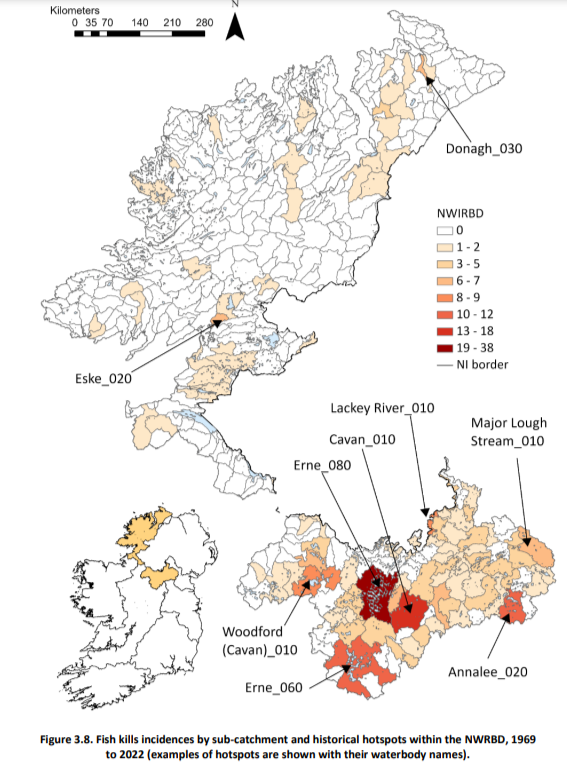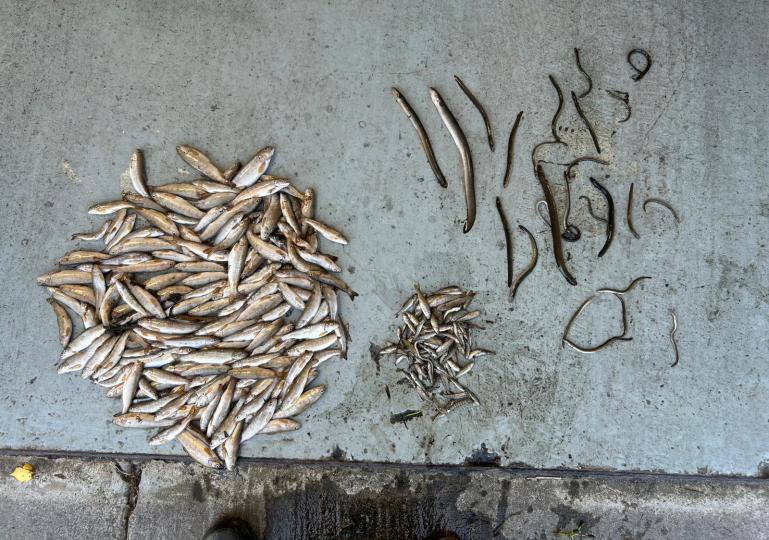Featured photo: Deceased species following a fish kill at Skeoge River, Co Donegal, June 2024. Inland Fisheries Ireland.
A major new report has revealed that 2,107 fish kills were reported in Irish rivers and lakes over the last 50 years.
The detailed study published this week by Inland Fisheries Ireland is the first comprehensive overview of related trends, locations, causes, and population recoveries, over the 53-year period.
Donegal saw 61 fish kills investigated between 1969-2022.
The report reveals that Northwestern River Basin District (NWRBD) was the third most impacted region, with 310 fish kills reported.
Although there were numerous fish kill events reported in Donegal, most incidents occurred in counties Cavan and Monaghan.
The most heavily impacted river sub-basin waterbody was the Erne with 38 fish kills reported, occurring regularly since the early 1970s.
There were 7 fish kills in the Donagh area in Inishowen since 1969. The Eske region recorded six incidents between 2000 – 2017.

IFI’s ‘Fish Kills in Ireland – History, Current Status, and Recovery’
Nationally, the most common known cause of fish deaths was agriculture, followed by eutrophication, industrial, municipal, mining, construction, and other activities.
Separately, Inland Fisheries Ireland records show that almost 19,000 fish died in 30 recorded fish kill occurrences between January 2023 and July 2024. Fish mortalities included Atlantic salmon, trout, eel and lamprey of all ages.
IFI continue to investigate fish kills in Wicklow, Cork and Donegal that took place in recent months. In Donegal, more than 300 fish died in a pollution incident on a tributary of the Skeoge River, in Bridgend, which flows into a Special Area of Conservation.
Juvenile brown trout and European eel were found dead in a 1-kilometre stretch of the water.
IFI environmental officers have been investigating since Thursday June 6th. Donegal County Council is also carrying out its own investigation into the pollution event.
Dr Ronan Matson lead author on the new report, and eastern region Director at Inland Fisheries Ireland(IFI) said: “Fish kills caused by pollution are heartbreaking for local communities. Many of these lethal events are needless, avoidable, and criminal.
“The ripple effect of ecological damage on biodiversity is long-lasting – at a time of rapid environmental change. Best practice must always be adhered to in all works in/near watercourses.
“IFI staff deploy an emergency response to any fish kill incident. It is crucial that any signs of concern are reported to IFI immediately to its 24/7 number, 0818 34 74 24. This enables officers to respond swiftly, find a cause, and prosecute those responsible.”
Digitised details relating to the new study are now available to the public on Inland Fisheries Ireland’s open data portal.
Tags:







